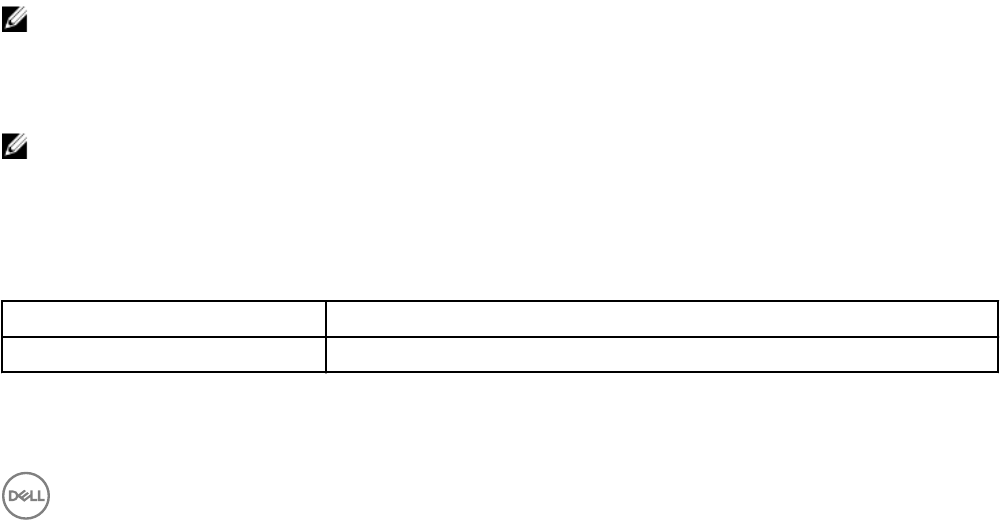Deployment Guide
Table Of Contents
- Dell OpenManage Deployment Toolkit Version 5.5 Command Line Interface Reference Guide
- Introduction
- Command Syntax Overview
- DTK Seamless package
- SYSCFG
- Features
- SYSCFG General Options
- SYSCFG For BIOS Configuration
- SYSCFG BIOS commands
- BIOS Option Settings
- Boot Settings
- Integrated Devices
- Network Settings
- Memory Settings
- Miscellaneous Settings
- One-Time Boot
- Processor Settings
- SATA Settings
- Serial Communication
- Slot Disablement
- System Information
- System Profile Settings
- System Security
- UEFI Boot Settings
- DTKTORACADM
- SYSCFG Options On PowerEdge Systems Prior To PowerEdge 12G Systems
- Sub Options And Arguments For power Option
- Sub Options And Arguments For tcm Option
- Sub Options And Arguments For tpm Option
- SYSCFG For BMC And Remote Access Controller Configuration
- bmcversion
- chassistype*
- clearsel*
- controlpanelaccess
- deviceguid*
- encryptkey
- fiberchannel
- floppy
- formfactor
- hddfailover
- hpcmode
- htassist
- idecdrom
- idracgui
- lpt
- memdynamicpower
- memintleave
- memremap
- mouse
- noraidprompt*
- oldsetuppwd
- oldsyspwd
- opticaldrivectrl
- remflashmedia
- serial1
- serial2
- slotname
- sma
- sysrev*
- usb
- usbflash
- vflash
- identify
- idracversion
- kvmstatusonlcd
- lancfgparams
- lanchannelaccess
- lanchannelinfo
- lanuseraccess
- lcd1
- lcd2
- loaddefaults*
- nextboot
- nmibutton
- passwordaction
- pefcfgparams
- powerbutton
- powerctl
- racreset*
- serialcfgparams
- serialchannelaccess
- serialchannelinfo
- serialuseraccess
- solaction
- solcfgparams
- ssninfo
- useraction
- username
- version*
- virutualmedia
- SYSCFG For State Configuration
- SYSCFG for System Configuration
- SYSCFG For IPv6 Configuration
- PCI Reporting
- RAIDCFG
- Features
- Supported RAID Controllers
- RAIDCFG Options And Arguments
- RAID Configuration Utility Options And Arguments
- General Help
- Enumerating RAID Controllers
- Creating Virtual Disks
- Enumerating Array Disks
- Blinking And Unblinking Array Disks
- Enumerating Virtual Disks
- Deleting Virtual Disks
- Increasing Virtual Disk Size
- Setting A Virtual Disk As Bootable Virtual Disk
- Blinking And Unblinking Virtual Disks
- Setting Virtual Disk Name
- Setting Environment Variables
- RAID Replication Options
- Assigning, Unassigning, And Listing Global Hot Spares
- Importing And Clearing Foreign Configurations
- Importing Secured Foreign Configuration
- Displaying Foreign Key Ids
- Creating Encryption Key
- Changing Encryption Key
- Deleting Encryption Key
- Configuring Physical Disk Rebuild
- Configuring Array Disk As RAID
- Configuring Physical Disk State
- Replacing Physical Disk Of A Virtual Disk
- Consistency check for virtual disk
- Erasing Encrypted Physical Disk
- Discarding Preserved Cache
- Initializing Virtual Disks
- Resetting The Controller
- Enabling And Disabling Persistent Dedicated Hot Spares
- Setting And Displaying The PCIe Link Speed
- Setting Boot Mode
- Configuring Auto Import
- Miscellaneous Options
- Quick Reference To RAIDCFG Commands
- UPINIT
- Messages And Codes
- BMC Platform Events Filter Alert Messages
- Sample File Formats

4
SYSCFG
This section documents the Deployment Toolkit (DTK) system conguration utility. It describes the command line parameters,
conguration le format, and individual executables used to congure server BIOS and Baseboard Management Controller (BMC)
settings, DTK state settings, and system information including PCI device detection.
Features
The SYSCFG utility:
• Displays help and usage information.
• Outputs conguration options to a le or screen.
• Reads conguration options from a le or Command Line Interface (CLI) parameters.
• Congures BMC/Remote Access Controller (RAC) users, local area network (LAN) channel and serial channel settings,
BMC/RAC platform event lter (PEF) settings, and BMC/RAC serial-over-LAN (SOL) settings.
• Congures the nonmaskable interrupt (NMI) and power button.
• Reports the BMC/RAC rmware version, BMC/RAC device global unique identier (GUID), and BMC/RAC LAN channel and
serial channel information.
• Reports BMC/RAC session information.
• Clears BMC/RAC system event log (SEL).
• Restores BMC/RAC factory defaults.
• Records and reports the state data value.
• Displays system conguration information.
• Returns specic error codes and messages.
• Logs activity to a given lename.
• Congures the BIOS features using ini le, DTK xml le, and ws-man xml le.
NOTE: In Microsoft Windows Preinstallation Environment (Windows PE), the SYSCFG utility is located at \dell\toolkit
\tools or \dell\toolkit\tools directory. In Linux, you can nd it in the/opt/dell/toolkit/bin directory.
SYSCFG General Options
NOTE: Some of the options in SYSCFG are followed by an asterisk. The asterisk is not part of the command syntax. Such
options are used for reporting purposes only. These commands do not accept any sub-options or arguments. The values
associated with these commands are reported by the BIOS. You cannot modify these values.
No Option
Table 7. No Option
Valid Arguments NA
Description The SYSCFG utility displays the usage information.
21










